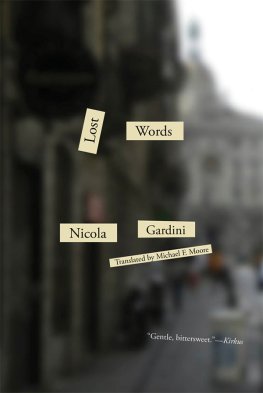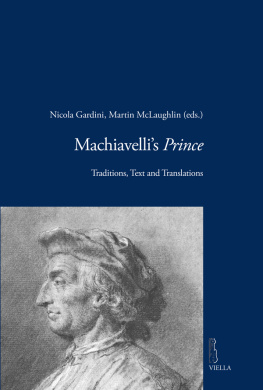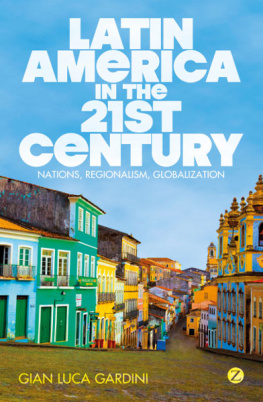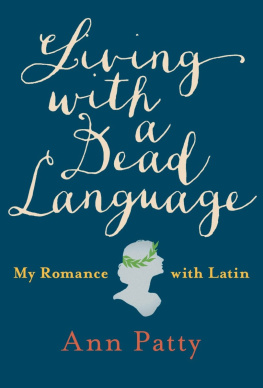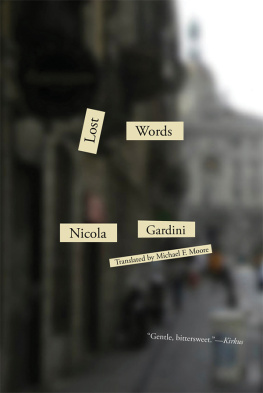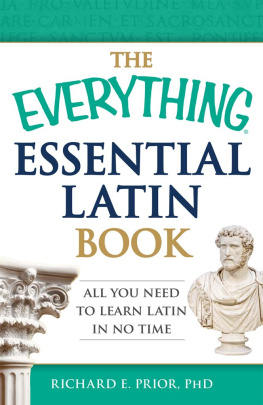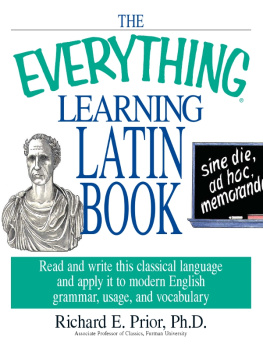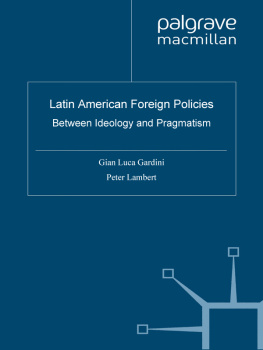LONG LIVE LATIN
ALSO BY NICOLA GARDINI
Lost Words
LONG LIVE LATIN
The Pleasures of a Useless Language
NICOLA GARDINI
Translated from the Italian by Todd Portnowitz

First published in Great Britain in 2019 by
Profile Books Ltd
29 Cloth Fair
London
EC1A 7NN
www.profilebooks.com
First published in the United States of America in 2019 by
Farrar, Straus and Giroux
Originally published in Italian by Garzanti, Italy, entitled Viva il latino
Copyright Nicola Gardini, 2016
Translation copyright Todd Portnowitz
Originally published in Italian by Garzanti, Italy, entitled Viva il latino
Cover design by Luke Bird
Marble background image Koson Rattanaphan / Alamy
The moral right of the author has been asserted.
All rights reserved. Without limiting the rights under copyright reserved above, no part of this publication may be reproduced, stored or introduced into a retrieval system, or transmitted, in any form or by any means (electronic, mechanical, photocopying, recording or otherwise), without the prior written permission of both the copyright owner and the publisher of this book.
A CIP catalogue record for this book is available from the British Library.
ISBN 9781781259399
eISBN 9781782833994
To Rosanna Crocitto
Contents
Ode to a Useless Language
For many people, Latin is useless. I wont enter into a discussion on the meaning of utility, a concept with variations and stratifications that are centuries in the making, and which itself merits an entire book. What I will say here, however, is that those many peoplecivilians, politicians, professionals in every fieldhave a sadly (and dangerously) limited idea of education and human development. What their focus on utility betrays is the belief that, in the end, knowledge amounts to know-how, that thought should be immediately adapted toward a practical aim. But if that were the case, knowledge would hardly be useful: wed have surgeons, plumbers, and not much else, given that machines are growing more and more responsible for satisfying our primary needs. Eventually the surgeon or plumber will disappear too. And if such is the fate of knowledge, that it be surrendered to machinesor, as we put it more often these days, to technologywhat exactly will there be for humans to know? Of course, well have to learn how to build the machines and keep them functioning, and to dispose of the remains when they become obsolete, and to procure the materials necessary to build new machines. In short, all in service of machines, with the idea, no doubt, that machines are fundamental, the only truly useful thing, the all-encompassing solution But what about the rest? Those needs that arent immediate, that arent practical or distinctly material, and yet are no less urgent? The so-called spirit? Memory, imagination, creativity, depth, complexity? And what about the larger questions, which are common to other essential domains of knowledge, including biology, physics, philosophy, psychology, and art: where and when did it all begin, where do I go, who am I, who are others, what is society, what is history, what is time, what is language, what are words, what is human life, what are feelings, who is a stranger, what am I doing here, what am I saying when I speak, what am I thinking when I think, what is meaning? Interpretation, in other words. Because without interpretation there is no freedom, and without freedom there is no happiness. This leads to passivity, a tacit acceptance of even our brighter moods. One becomes a slave to politics and the market, driven on by false needs.
Then there are those, perhaps a smaller group, who maintain that Latin does in fact have a purpose. Latin, according to this camp, teaches us how to reason and instills a certain discipline, which can then be applied to any other task. So Latin is just like math. I cant tell you how many times I heard this growing up, and how often I hear it still! They defend Latin by granting it the merits of other branches of knowledge, while ignoring its own unique meritswithout recognizing that Latin offers something that math cant offer, just as math offers things that Latin cant.
Neither argumentthat of the usefuls nor that of the uselessesis quite what engenders and nourishes a love for Latin. The objection given by the uselesses is just as weak as that of the usefuls: that Latins purpose is to train the mind. Its rich morphology for jogging the memory, its syntax for stimulating our logical-deductive capacity, and so on... All true. But if Latin is this alone, an exercise gym, it would be all the same to study other complex languages, such as German, Russian, Arabic, and Chinese, which have the added benefit of being still in use. And wouldnt algebra serve just as well to reinforce our memory and logical skills? Or chemistry? Even a mystery novel might do the trick!
The frail argument offered by the usefuls has, for decades, helped to prop up shaky pedagogical and rhetorical methods, only adding fuel to the fire of the uselesses. The structure wont hold anymore. No, the study of Latindemanding, challenging, exhausting, and, like a good hike through the mountains, restorative in and of itselfmust not be treated like a cognitive boot camp. Next well be going to the Louvre and the Metropolitan Museum to sharpen our vision and to La Scala to improve our hearing. Divers and ballerinas have beautiful physiques, no doubt, but theyve built those muscles so they can dive and dance, not to look at themselves in the mirror. When we study Latin, we must study it for one fundamental reason: because it is the language of a civilization; because the Western world was created on its back. Because inscribed in Latin are the secrets of our deepest cultural memory, secrets that demand to be read.
One other minor contention against the usefuls and the uselesses: Latin is beautiful. This fact undergirds all that I will be saying in these pages. Beauty is the face of freedom. What all totalitarian regimes have most strikingly in common is their ugliness, which spreads to every aspect and form of life, even to nature. And by the adjective beautiful I mean to say that Latin is various, malleable, versatile, easy and difficult, simple and complicated, regular and irregular, clear and obscure, with multiple registers and jargons, with thousands of rhetorical styles, with a voluble history. Why give ourselves practical reasons for encountering beauty? Why impede ourselves with false arguments about comprehension? Why submit ourselves to the cult of instant access, of destination over journey, of answers at the click of a button, of the shrinking attention span? Why surrender to the will-less, the superficial, the defeatists, the utilitarians? Why not see that behind the question Whats the point of Latin?perhaps posed unassuminglyrests a violence and an arrogance, an assault on the worlds richness and the greatness of the human intellect?
I would like to put the reader on guard against one more noxious clich. Even among specialists one hears the term dead language thrown around. This characterization arises from a misconception of how languages live and die, and a hazy distinction between the written and the oral. Oral language is linked immediately with the idea of being alive. But this is a bias. Latin, even if its no longer spoken, is present in an astounding number of manuscriptsand writing, particularly literary writing, is a far more durable means of communication than any oral practice. If, therefore, Latin lives on in the most complex form of writing weve yet imagined, namely literature, is it not absurd to proclaim it
Next page

